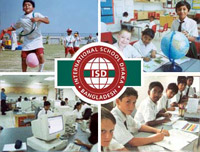
Julie Lindsay, an educational technology specialist at the International School Dhaka, Bangladesh, runs an "Information Technology in a Global Society" class for the school's International Baccalaureate students.
To stimulate student debate, Julie uses a blog, the ITGS forum, where her students can discuss issues arising from the course. Earlier this month, the students were asked their opinions about the One Laptop Per Child project. Their responses are interesting and insightful:
- "I think the OLPC is something that will bring immense changes in all fields but once it has been implemented properly. I think that for the first couple of years, problems such as theft and a loss in developing countries in expected."
- "[ ]...Bangladesh already can produce decent brand new desktop computers with a price tag of Tk. 9,000. Second hand desktop computers can be bought for around Tk.5,000 to 6,000 range. Now if we do some calculations $100 is equivalent to around Tk.7200. If Bangladesh purchase’s (sic) these laptops we lose a large amount of our valuable foreign currency reserve. Why don’t we develop and experiment with the indigenous Tk.9000 desktop and try to bring down the price?...[ ]
- "[ ]...even if underpriviledged (sic) children are provided with the laptops, don't they need the basic computing skills to use them? I think before a country like Bangladesh takes in the OLPC project, the government should first start a training program, and educate the underpriviledged (sic), raise the IT literacy rate. Just purchasing the technology and spending money on such projects will not work, the main area which lacks improvement is education."


Thanks for your thoughtful comments.
The difference between the OLPC Laptop and less-expensive local products start with the ability to use the Laptop in villages without power, the built-in mesh network, and its total portability. Even free desktop computers could not be used under these circumstances, nor could they remain on the network even if they could be carried home. The use of Free Software, and plans for Free textbooks and other educational resources are another bonus for the OLPC Laptop.
I am not clear on what you think basic computing skills are. The Laptop will include drawing programs, perhaps TuxPaint, designed for children; music programs (playback and composition); and many other applications requiring neither literacy nor programming skills.
* Look at the Debian Junior software packages, which run from preschool to secondary school levels.
http://www.debian.org/devel/debian-jr/
* Look at the Squeak environment, based on Smalltalk (which was invented at Xerox PARC as the prototype for software for a children's school computer).
http://www.squeak.org/